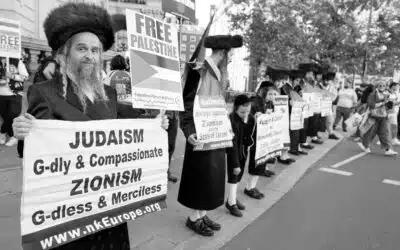I recently posted about the controversy surrounding actress Scarlett Johansson’s role as the new face of SodaStream, which operates a factory in the illegally-constructed West Bank settlement of Ma’ale Adumim. In that post, I wrote that “companies like SodaStream can take advantage of not having to pay their employees the minimum wage, as they would if they operated in Israel. Palestinian workers also typically do not receive holidays, overtime pay, health insurance, or sick pay, as mandated by law for Israeli workers.” That was inaccurate.
I’ve since learned that Israel’s High Court of Justice actually ruled on October 10, 2007 that companies operating in settlements must do so under Israeli law. The Court’s conclusion was that “applying foreign law on the Palestinian workers as opposed to applying Israeli law on the Israeli workers violates the Palestinian workers’ basic rights and subjects them to discrimination… and that given the circumstances under consideration, Israeli law applies to the labour relations between the Israeli employers and the Palestinian workers who are residents of the West Bank.”
Yet it remains true that Israeli companies commonly don’t comply with this in their settlement operations, as the 2012 report from the International Federation for Human Rights I cited indicated. “The high court decision enforced Israeli labour laws for Palestinians, which actually binds all settlements”, said Eyal Hareuveni of the Israeli human rights group B’Tselem in 2012. “But there is no enforcement.”
Another point of clarification: from what I’ve gathered, SodaStream is not among those companies that violates Israeli law, but treats its Palestinian employees as equals in this regard.
But I want to reinforce a number of other points. I wrote, “For starters, the factory was constructed illegally on land expropriated from its Palestinian private owners. Israel expropriates land and resources from Palestinian territory and profits from it while severely constricting the ability of the Palestinians to develop their own economy in the occupied West Bank.” Forward magazine notes that
It was made possible in the 1970s by one of the largest expropriations of Palestinian land implemented by Israel during its 46-year occupation of the West Bank.
According to the Israeli human rights group B’Tselem, the land on which the settlement and its industrial zone, including SodaStream, now sit was taken from the Palestinian towns Abu Dis, al-’Izariyyeh, al-’Issawiyyeh, a-Tur and Anata. Other expropriated lands are areas in which the Jahalin and Sawahareh Bedouin tribes lived before Israel evicted them.
The establishment of Ma’ale Adumim and Mishor Adumim “meant loss of grazing and farming land and, in effect, loss of the agricultural way of life” for these villages, B’Tselem related in its July 1999 report on the expropriation. The mass expropriation “also denied these villages the land reserves they needed for housing, industry and public institutions.
I wrote that “A company like SodaStream receives benefits from the Israeli government, which seeks to incentivize such businesses to operate in illegal West Bank settlements with subsidies, tax benefits, grants, etc.” Illustrating this point, Forward tells the interesting story of how SodaStream got started in Ma’ale Adumim.
Peter Wiseburgh, the British-born Israeli who established the company in the 1990s. Wiseburgh spoke in 2000 of how he searched far and wide for facilities and found the perfect bargain in the Mishor Adumim settlement.
“When I got here, the space was deserted and full of pigeons. So I just turned around and walked away,” he told the business paper Globes. “A week later, the Jerusalem Economic Corporation [which leases the industrial zone from the military administration in the West Bank] offered to give me the site for free for the first six months, and then for 44,000 shekels rent per month and also offered $100,000 in cash for the cost of renovating the place. I rented 13,000 square meters, and it was a good deal. Not a political act….
Mishor Adumim is classed as National Priority Area A, which brings companies locating there a package of benefits, including a reduction of Israel’s 25% corporation tax, in some cases down to single digits….
The government reimburses companies making products in the West Bank for the tariffs that the E.U. imposes on them, in contrast to goods made in Israel proper, which flow into the E.U. duty free.
The SodaStream corporate leadership argues having a factory located in a West Bank settlement doesn’t offer it any financial advantage because such benefits are also available for companies operating in “National Priority Areas” in Israel. But, one, it is plain stupid to deny demonstrable facts, i.e., that the company enjoys financial benefits for operating there; and, two, those “National Priority Areas” in Israel serve much the same discriminatory purpose as they do in the West Bank. As Human Rights Watch notes,
The government demolishes Bedouin homes based on discriminatory laws and rules, and without respect for the Bedouins’ dignity or the country’s human rights obligations….
“Israel has been shoving Bedouin out of their communities and into ever-shrinking space while encouraging and even helping Jewish Israelis to move in,” said Joe Stork, acting Middle East director at Human Rights Watch….
Israel has allocated funding for an economic development program to benefit the Negev Bedouin, and designated Bedouin communities as among the “national priority areas” eligible for other subsidies.
Incidentally, as Forward reports, construction a new SodaStream plant in a “National Priority Area” in the Negev is currently underway.
Now I want to come to a New York Times article on the controversy surrounding Scarlett Johansson and Sodastream. The Times shows a glimpse into the life of one of the workers at the SodaStream plant:
Hassan Jalaita, who for 18 years has repaired Israeli Army jeeps at the Zarfati garage here.
Those are the very same jeeps that confront Mr. Jalaita at the checkpoint he crosses each morning. The same ones that sweep through villages where his friends and relatives live. But those jeeps also help pay his $1,471 monthly salary at Zarfati, more than triple the minimum wage in Palestinian areas of the West Bank, where a 19 percent unemployment rate and lack of labor laws make finding a decent job difficult.
“I feel like I’m not a human being — we are serving the occupation,” said Mr. Jalaita, 47, a father of five, two of them university students. “I am forced to work here because I have a house, I have a family. Tomorrow, if there is another place to work, if there is work in Palestine, I will do it.”
Then the Times has this comment:
Israeli industries operating in settlements that most of the world considers illegal…
This is outrageous. Apart from Israeli itself, there is not a nation on the planet that considers Israel’s settlements legal. Every country on Earth recognizes Israel’s settlements as a violation of international law. That includes, officially, the U.S., although subsequent administrations have maintained a policy of not saying it. This is standard propaganda from the Times; “most of the world” is their usual euphemism for “the entire international community”. The point of the euphemism is to make it seem as though there was some dispute about this, as though it was a controversial issue, when it is emphatically not.
Then in another example of blatant propaganda, the Times states:
Palestinian officials and boycott advocates say that these settlement businesses exploit a vulnerable work force, and that Israel’s occupation is largely responsible for the moribund Palestinian economy that makes its own jobs appealing.
Palestinians and boycott advocates say? Once again, the purpose of this propaganda is to create the illusion that this was somehow a matter for debate, as though it was merely a claim. But once again, there is absolutely nothing controversial about it. It is absolutely indisputable that Israel’s occupation severely hampers the Palestinian economy. The Times could report “The international community and bodies such as the World Bank and IMF say….” But that would defeat the purpose of instead reporting it in propaganda terms. Here is a World Bank report, for example, which states plainly that “Restrictions on economic activity in Area C of the West Bank have been particularly detrimental to the Palestinian economy”. Here’s another World Bank report pointing out how Israel’s restrictions restrain economic growth in the West Bank. Here’s an IMF report noting that Israel’s restrictions “stifle growth” and are “the key obstacle to a more sustainable growth pattern”.
But Times readers are instead supposed to think that it is only a claim made by advocates of boycotting Israel and Palestinians themselves that Israel’s occupation stifles the Palestinian economy.


